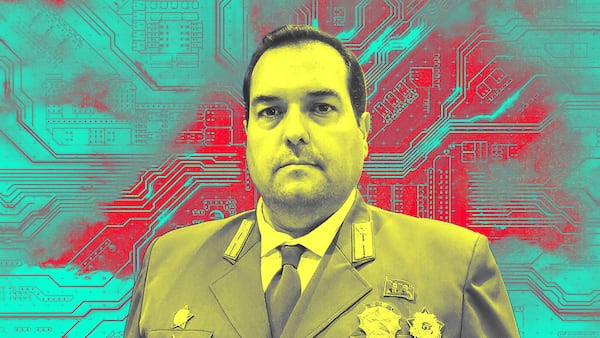- DL News was in the courtroom when the dev made a final plea for his innocence.
- Prosecutors and Pertsev's counsel traded final arguments as the case went to judges for verdict.
- The case will shape the future of DeFi privacy.
After 19 months of investigation, debate about the meaning of open source code, and two days of testimony in a Dutch courtroom, the case against Alexy Pertsev finally boiled down to one final plea from the Tornado Cash dev as he confronted possible conviction and prison.
“I cannot comprehend two things,” Pertsev said in his closing remarks on Wednesday.
“The fact that I am responsible for abuse of Tornado Cash by someone else. The second thing is prison time as punishment of any amount. I don’t see how it will help me, or anyone else, or victims.”
64 months
Public prosecutor Martine Boerlage said the 30-year-old, Russian-born, software whiz should be sentenced to 64 months in prison for the laundering of $1.2 billion through the decentralised crypto mixer.
But Pertsev urged the court to accept that he was nothing more than a codewriter who did his work with no intent on facilitating crypto transactions for the perpetrators of DeFi hacks and heists.
“I never had the desire to help or tolerate criminals in any way, I have a different mindset,” Pertsev said. “I hope you understand that.”
The two-day trial in the Dutch city of s-Hertogenbosch was presented in a Babel of Dutch, English, and Russian, with interpreters flanking the young developer and often struggling to translate the technical jargon of crypto into terms attendees could understand.
What is clear is that the verdict in the case may well shape how software developers worldwide write code for DeFi projects.
Pertsev’s defenders — and there are many in the DeFi community — have said the case could create a “chilling effect” that deter devs from participating in projects that may be swept up in money laundering investigations by the authorities.
As a result, the Pertsev case is poised to draw new boundaries for privacy in the crypto space.
His defence lawyer, Keith Cheng, argued that Tornado Cash is a privacy solution for the Ethereum blockchain, where transactions are immutable. That means that someone’s entire history is public.
Perfect tool
Tornado Cash cuts links to provenance by mixing crypto in a pool run by self-operating smart contracts.
And the prosecution contended that this makes it a perfect tool for criminals because it does not monitor participants and transactions for illicit activity at the protocol level.
Both the prosecution team and defence lawyer dug deep into the inner workings of the Tornado Cash protocol.
‘Tornado Cash is more than just smart contracts. It was run like a company.’
— Dutch Prosecutor
They examined its phases of development, its smart contract-run pools, allocations and airdrops of the native token TORN, and the relayer mechanism which grants even more privacy.
Even so, the prosecutor stated on Wednesday that “how Tornado Cash works doesn’t matter, what matters is the outcome.”
And the outcome, she said, is that criminals used the platform to obfuscate the origins of their illicit funds.
North Korean cybercrime group Lazarus, which has been linked to several major hacks in DeFi, allegedly used Tornado Cash to launder more $625 million from the Axie Infinity Ronin Bridge hack in 2022, according to law enforcement officials.
Employed and salaried
“Tornado Cash is more than just smart contracts,” the prosecutor argued. “It was run like a company.”
PepperSec is the company Pertsev set up together with the other prominent Tornado Cash developers, Roman Storm and Roman Semonov. Storm will sit trial in the US in September.
PepperSec allegedly employed and salaried the developers to work on Tornado Cash.
‘Not Pertsev or anyone else can control what is inside the smart contracts, only the person who moves the money has the controls.’
— Keith Cheng, Alexey Pertsev's lawyer
Boerlage said that through this legal entity, the three men “collectively constitute the board of directors and also own the company behind Tornado Cash.”
She also said they enriched themselves through Tornado Cash’s token allocations.
During the trial, the judges and prosecutor pressed Pertsev on what he did when he found out that criminals were using the mixer.
The state said Pertsev did not take enough action to address the activity.
He also avoided taking responsibility by pointing out centralised exchanges should do their due diligence on transactions coming from Tornado Cash, the prosecution contended.
But Cheng countered that the prosecution was failing to understand the technical nature of smart contracts and other DeFi workings. If they did, they would not have brought charges against his client.
“Not Pertsev or anyone else can control what is inside the smart contracts, only the person who moves the money has the controls,” told the judges.
Even if the website created for Tornado Cash was taken down, any savvy user would still be able to access the protocol through other user interfaces like Etherscan.
‘It’s like putting additional locks on the door while there are no walls at all.’
— Alexey Pertsev
And if Tornado Cash is updated with some know-you-customer, or KYC, measures, the original code for the smart contracts already exists, and always will, for anyone who wishes to deploy it.
“It’s like putting additional locks on the door while there are no walls at all,” Pertsev explained to the judges.
That’s why Pertsev and the others created a compliance tool for Tornado Cash, which users can chose to use to share their transactions history with selected third parties to
This in itself shows that the developers were looking for solutions for Tornado Cash’s criminality problem.
Like a VPN
“Pertsev cannot be held responsible for abuse of the project by third parties,” Cheng said. “Just like VPN developers cannot be held responsible. It’s for the users to use the platform legitimately.”
Cheng highlighted that the use of a VPN is normal and legal in the Netherlands, and it is even advised in situations where people connect to public networks to secure their data and privacy.
Tornado Cash needs to be considered in the same way, he argued.
Ultimately, the project is open source and values the community, with “no hidden agenda or criminal motives,” Cheng said.
As for Pertsev, he struck a wistful note at the trial’s conclusion.
“Solving technical problems is my passion, I suffer from not being able to do this,” said Pertsev, a man of few words.
Now he will wait to learn his fate. The three judge-panel is expected to deliver a verdict on May 14.
Inbar Preiss is DL News’ Brussels correspondent. Contact the author at inbar@dlnews.com.








